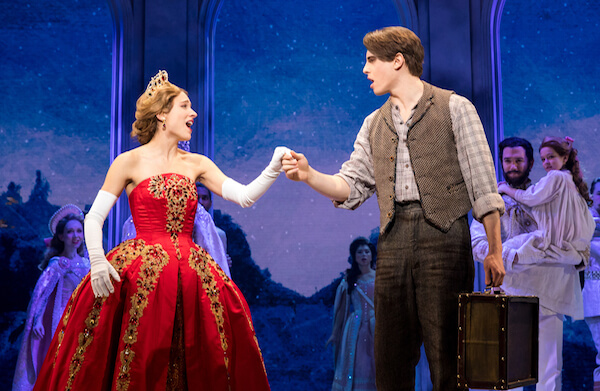“Allegiance,” a bold, heart-stirring musical starring George Takei, shines a light on a dark chapter in American history, tracing the conflict of identity that confronted people of Japanese heritage living in America during World War II. While the book is credited to Marc Acito, Jay Kuo, and Lorenzo Thione, the story is inspired by Takei’s actual experience as a young boy in an internment camp.
Immediately after Pearl Harbor is attacked, the innocents are branded the enemy, ripped from their homes, and literally railroaded into prison camps, forced to live in appalling conditions. There’s no running water but plenty of fleas. They are torn between devotion to their old traditions and love of their new country. Even those born in America and who never set foot on Japanese soil are considered enemy alien “Japs,” not American citizens.
The production itself suffers from a similar identity crisis. On the one hand, it’s a solemn drama about wartime atrocities, fraught with hunger, bloodshed, and death. On the other, it’s a bouncy musical — out of nowhere, the inmates start swing dancing and burst into song, crooning that they “Gotta get in, gotta get in the game” and band together to make their camp livable.
Musical starring George Takei traces the plight of Japanese Americans during WWII
Although director Stafford Arima does a nice job keeping the action moving, he has a tough time reconciling these conflicting moods. Certain moments, including the death of a baby and the accidental murder of a beloved character, should pack a punch but instead are muffled, drenched in a gooey film of sentimentality.
The score, by Jay Kuo, is a surprising mix of plaintive ballads, Japanese folk tunes, jazzy ditties, and triumphant power anthems that could have been lifted from “Les Miz.”
One delicately touching number, “Wishes On the Wind,” features traditional Japanese costumes and dance while the company sings:
“Wishes on the wind Dreams that touch the sky Our heads are bowed Our eyes are lifted Hope is riding high.”
The folk song is enlivened by Donyale Werle’s set featuring a magical “wishing tree” filled with fluttering, colored paper ribbons, a moving counterpoint to the grim encampment set. The handsome period costumes are by Alejo Vietti.
The plot revolves around Sammy Kimura, as a young man played by Telly Leung and as an elderly man by the splendid Takei. Sammy defies his stern father Tatsuo (Christophoren Nomura) and enlists as a soldier (later in the war, a segregated Japanese battalion was allowed) and emerges as a hero, with his picture on the cover of Life magazine. He is smitten by a caring blonde American nurse (an affecting Katie Rose Clarke), then clashes with a fellow inmate (Michael K. Lee) who protests the war — and their barbaric treatment — by burning his draft notice.
Tatsuo is outraged when they are required to fill out a government questionnaire, renouncing loyalty to the emperor and swearing unqualified allegiance to the United States of America. “They took our farm, they took our home,” he sings. “And now our honor is at stake. But that they’ll never take.”
Sammy is close to his sister Kei (played by the winsome Lea Salonga, of “Miss Saigon” fame), but when allegiances abruptly shift, his world starts to crumble.
The former “Star Trek” actor, who is 78, by the way, should be commended for bringing such a deeply personal and unlikely subject to a Broadway stage. Though no one should be surprised — he has been a lifelong activist, fighting for civil rights in the 1960s, and in 2005 coming out as gay to join the push for marriage equality. You may recall in 2008 he was highly vocal against Proposition 8, the California ballot initiative that banned same-sex marriages there. He married his partner Brad Altman in a highly publicized ceremony that same year. If you are looking for any gay themes in this musical, however, you will be disappointed.
Far from just a slice of obscure history, “Allegiance” resonates powerfully today. Given the current political discourse, with talk of a hateful campaign to eject illegal immigrants from the US and build massive walls to keep them out, “Allegiance” reminds us just how inhumane and dangerous demonizing a group of people based solely on their heritage can be.
ALLEGIANCE | Longacre Theatre, 220 W. 48th St. | Tue., Thu. at 7 p.m.; Wed., Fri.-Sat. at 8 p.m.; Wed., Sat. at 2 p.m.; Sun. at 3 p.m. | $55-$149 at allelgiancemusical.com | Two hrs., 30 mins., with intermission


































